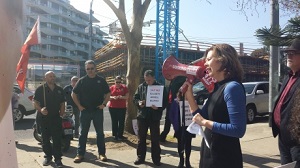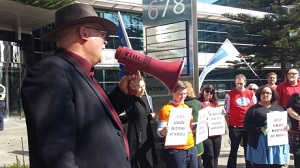Abuses by Apple’s supplier NXP get worse in the Philippines
IndustriALL launches new Day of Action to STOP Precarious Work
Australian unions protest denial of visas to dismissed Ansell workers
Guatemala Ternium union wins major victory
Striking workers vote down a meagre proposal of Bombardier
 |
Aug 28, 2014: Apple will launch the much-anticipated iPhone 6 from September, but a key component comes from NXP Semiconductors. Both NXP and Apple are ignoring their corporate and moral responsibility for 24 sacked trade union leaders in the Philippines.
Until this grave labour rights violation is reversed, the iPhone 6 will be ethically flawed.
A broad coalition of campaigning organizations is calling on NXP to reinstate 24 trade union leaders who were illegally sacked during CBA negotiations on 5 May. However, while the company has claimed to IndustriALL that it is intervening and seeking a resolution, the reality at the plant is that management is stepping up its effort to bust the union. Serious violations of workers’ rights are occurring on a daily basis and management refuses to take the essential step of reinstating the 24 union leaders.
NXP’s union busting of the MWAP union at its Cabuyao facility near Manila is an egregious violation of international standards on labour rights. The abuses also fundamentally violate NXP’s code of conduct, as well as the ethical supply chain commitments of Apple.
Apple is a key customer of NXP and an NXP microchip will reportedly give the new iPhone 6 the capability to wirelessly pay for items like car park tickets and groceries. Over 150,000 consumers and activists wrote to Apple through a SumOfUs campaign to demand the technology giant intervenes and instructs NXP to act in line with Apple’s supply chain commitments. Although Apple have opened initial dialogue with IndustriALL, the 24 illegally sacked trade union leaders have not been reinstated.
The latest aggressive anti-union intimidation at the plant in the LISP1 special economic zone include: filing “unruly behaviour” and “loitering” charges against remaining members who are actively protesting the mass sacking of their elected representatives; security guards taking photos and video of remaining union members, including while they eat their lunch; surveillance cameras installed throughout the plant; and bans on wearing t-shirts or posting messages on social media with slogans supporting the sacked 24.
MWAP president Reden Alcantara told IndustriALL Global Union:
“We continue to stand strong. We will continue to fight back against this multinational giant who refuses to respect its workers. We are drawing inspiration from your support and we will continue to count on you as we gear up for an intensified struggle.”
The Philippines’ Department of Labour and Employment is mediating talks towards a solution and has made a proposal to both sides. DOLE’s offer includes a 5.2 per cent wage hike, the reinstatement of 12 out of the 24 union officials who were illegally dismissed, and a decent separation package for the other 12.
IndustriALL Global Union general secretary Jyrki Raina stated:
“DOLE should be respecting the labour legislation of the Philippines and insisting on the reinstatement of the full trade union committee. MWAP, IndustriALL Global Union, and its supporters remain steadfast and clear in our call on NXP and Apple: #BringBackNXP24!”
 |
Aug. 29, 2014: IndustriALL Global Union is calling on all affiliates to once again mobilize their members to STOP Precarious Work, in conjunction with the World Day for Decent Work on 7 October 2014.
Regular, permanent and direct employment remains under constant attack from multinationals and other forces that are promoting precarious work. We strongly encourage affiliates to take action and denounce precarious employment and the insecurity, which is becoming everyday life for more and more workers around the world.
This Global Action is a cornerstone of the IndustriALL campaign to STOP Precarious Work. Mass global action helps to bring visibility to the issue and to strengthen national campaigns as well as IndustriALL’s position in challenging multinational companies, governments and the institutions of global governance. Every year, this mass mobilization sends a powerful message that workers everywhere will stand up to protect their rights.
In 2013, affiliates from 46 countries took part, and in many countries IndustriALL affiliates took action together. Actions included mass mobilisations in marches and rallies, distribution of campaign materials in workplaces, thematic workshops and conferences, demands on government, flash mobs, public hearings and protests outside company headquarters. Reports and photos of affiliates taking action can be found on the IndustriALL site at http://www.industriall-union.org/stop-precarious-work.
Some affiliates have already planned actions for 7 October 2014. In Canada, UNIFOR will organize a national Good Job Summit (3-5 October) as part of its campaign “Join the Revolution for Good Jobs”. The Summit will be a national dialogue between workers, students, government, employers and communities, aimed at finding new approaches to jobs and the economy.
The Rio Tinto Global Union Network will hold a global day of action against precarious work as part of the global campaign at Rio Tinto. The billion-dollar company is increasingly introducing precarious forms of work at its operations around the world. Other trade union networks in multinational corporations are strongly encouraged to take action this year, since MNCs and their supply chains are among the main drivers of the rampant spread of precarious work.
IndustriALL affiliates in Cambodia will target Export Process Zones (EPZs) where workers rights are largely undermined. Workers in a bus and on motorcycles, holding IndustriALL flags, will do rounds in the EPZs as part of a “caravan for decent work”:
Please, send information as soon as possible about the actions that your union intends to undertake to press@industriall-union.org. This information will be posted under a special section on the campaign page STOP Precarious Work. Don’t forget to send photos after the event as well.
A new IndustriALL publication Negotiating Security: Trade union bargaining strategies against precarious work is available for download. The publication reports about creative and progressive agreements that unions are pursuing to limit precarious work and protect workers.
 |
| Michele O’Neil, National Secretary of the TCFUA |
 |
| National President Andrew Dettmer |
Aug. 26, 2014: Unions held a rally outside of Ansell’s Australian headquarters following the denial of entry visas to a delegation of Sri Lankan union members. The Australian government denied the visas in an apparent attempt to sheld glove and condom maker Ansell from public exposure of its harsh and unjust treatment of its workers in Sri Lanka.
The visas were denied to the Sri Lankan head of the Free Trade Zones and General Services Employees Union (FTZGSEU), and two workers recently employed at Ansell’s manufacturing operation in the Biyagama Free Trade Zone in Sri Lanka. Ansell fired these and nearly 300 other workers when they struck in support of 11 sacked colleagues and trade union representatives in October 2013.
The Australian government’s official decision records state that the visas were denied for failing to have sufficient personal wealth.
AMWU National President Andrew Dettmer said that it is clear the Australian Government led by anti-union Prime Minister Tony Abbott has refused entry to the Sri Lankans on political grounds.
“We have a federal government denying lawful entry into Australia based on ideology and wealth. Is it any wonder that three Sri Lankan workers, two of whom were recently sacked by Ansell, have ‘insufficient’ personal funds by Australian standards?”
Michele O’Neil, National Secretary of the TCFUA, said the head of the FTZGSEU, Anton Marcus, is an international trade union figure and has been to Australia four times previously and it has never been a problem before now.
“These union delegates planned to come to Australia to talk about the anti-worker tactics implemented in Sri Lanka by Ansell and to seek international solidarity. We will continue to protest with or without our honoured guests to expose this company’s harsh and unjust treatment of workers in Sri Lanka.”
The FTZGSEU is pressuring for a fair settlement in Sri Lanka as the case against the unfair dismissal slowly winds its way through the Sri Lankan judicial system.
IndustriALL continues its campaign in support of the nearly 300 Sri Lankan workers unjustly dismissed by Ansell. It has included outreach to Ansell customers, 11,000 protest emails sent to Ansell management, a support mission to Sri Lanka, and an OECD Complaint.
“We commend our Australian affiliates CFMEU, TCFUA and AMWU for their support and we condemn the Australian government for siding with Ansell in blocking this union delegation,” stated IndustriALL Global Union General Secretary Jyrki Raina.
“The best way to resolve this dispute is through good faith dialogue with Ansell, not in the courts or in the streets. However until Ansell shows a willingness to work toward a fair settlement, we’ll continue to do everything we can to support FTZGSEU in this struggle,” added Raina.
Aug. 28, 2014: Dismissed union leaders at the Ternium steel plant in Guatemala – ranked as one of the world’s worst countries for workers – have won a major victory in their two-year struggle to uphold the right to organize.
Following a court decision ordering Ternium to reinstate the workers with the payment of lost wages, nine dismissed union leaders of the SITRATERNIUM union entered the plant on 22 August. The workers were accompanied by the court officer and staff from the United Nations office in Guatemala. Two of the dismissed workers have yet to be reinstated as a result of an error in the spelling in their names and the union is remaining on the alert to ensure the mistake is put right and that the workers receive their back wages.
The workers were illegally fired in 2012 after forming a union to stand up for their rights. Company management had constantly bragged that it could do whatever it wanted with its workers and that it didn’t care about government regulations. Abuses at the company included denying workers the right to take sick leave and forcing them to work seven days a week.
For the past two years the union leaders have endured major hardship in their struggle to uphold their rights. The members of the Sindicato de Trabajadores de Ternium de Guatemala (SITRATERNIUM), which is a member of IndustriALL affiliate FESTRAS, have been buoyed in their efforts by the unconditional support of the Ternium union network as well as by the solidarity of many other unions both nationally and internationally.
According to the ITUC Global Rights Index released in May 2014, Guatemala is ranked as one of the world’s worst countries for workers, who effectively have no access to the rights spelled out in their country’s legislation and are therefore exposed to gross unfair labour practices. As a result of decades of repression, fewer than 2 percent of Guatemalan workers are union members
The leading Latin American steel company Ternium has production centers in Argentina, Mexico, Guatemala, Colombia and the United States. The company manufactures steel and value-added products.
Aug. 28, 2014: Called to vote on the last offer made by the company, and supervised by the Ministry of Labour, Bombardier workers in Thunder Bay soundly proved their determination to fight for good jobs and a secure future in Ontario, Canada.
Members of Unifor Local 1075 went on strike on 14 July 2014 in response to Bombardier’s demands for deep concessions. The recent offer was put to a vote at the request of the company in accordance with provincial legislation offering such an option at each bargaining round. 80 per cent of the workers voted against the offer.
Commenting on the results of the vote Jerry Dias, Unifor National President said, “These workers have shown incredible resolve and determination in their struggle to maintain good jobs for today and for future generations.”
“These results send a clear message to Bombardier that the membership of this union supports its bargaining team, which has consistently told the company that it cannot accept the demanded concessions,” added Diaz.
If accepted the proposal would have meant large cuts in benefits for current workers and retirees, while offering a wage increase of less than one per cent over three years and denying the current defined benefit pension plan to those hired after 31 May 2014. Those hired in 2011 would have received no retiree benefits, and would have got a one-time payment of 350 CAD (245 EUR). More than half of the workers would have been affected by this concession.
Unifor Local 1075 President Dominic Pasqualino said there are better ways for the company to save money if it needs to do so. “Working with the union, the company can eliminate so many wasteful practices that there would be enough savings to both increase the company profits and continue to fund our modest pension,” Pasqualino added.